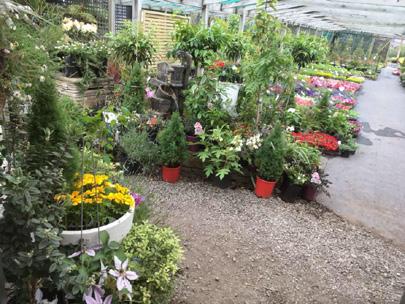
2 minute read
Gardening
It’s hot out there
During these hotter months water becomes vital, especially for your vegetables. They have a high percentage of water so they need plenty! If you have a bumper summer crop consider freezing, preserving or sharing your harvest so it doesn’t go to waste.
Advertisement
Kitchen Garden
• Water less often but more thoroughly.
Take your time and check that the soil is wet to at least 5cm. • Water in the early morning or early evening to reduce water loss due to evaporation. • If pests have become a problem use an environmentally friendly spray around your vegetables, spray late in the day when the bees have gone home. • Replace sticky traps when necessary. • Stay on top of weeds, as they compete for water and nutrients and give pests a place to hide. Use a hoe around the vegetables. • Sow seeds: cabbage, cauliflower, carrots, Brussels sprouts, silverbeet, spinach and leeks. It should be warm enough in most areas now to sow directly in to the garden, water often as they dry out quickly. • Plant seedlings: cabbage, beetroot, cauliflower, leeks, celery, pak choi, spinach, silverbeet, parsley, silverbeet. • To encourage tomatoes to ripen remove any leaves that are shading the fruit. Remove any damaged fruit straight away to prevent disease spreading, keep plants well watered and fed. Check the stakes are holding the weight as the plants become heavy with fruit. • Harvest garlic when tops have flowered then turned yellow. The lower leaves will have also started to turn brown. • Start harvesting fruit trees as they become ready, check their readiness by tasting. Remove any fruit that has fallen to the ground as this will help break the life cycle of bugs. • Check codling moth traps and change if necessary. • Check all fruit trees for overly heavy branches and remove some fruit early if necessary to protect the whole branch. • Keep plenty of water on passionfruit and tamarillos as they get close to harvest. • Trim away leaves covering grapes to expose fruit to ripen with the sun.
Cover with netting to protect the ripening fruit from the birds. • Start tidying strawberry beds.
Garden Colour
• Start planting spring bulbs: anemones, daffodils, freesias, ranunculus, sparaxis, ranunculus and ixias. Prepare the soil with compost and add a handful of bulb food as you plant. • Bulbs do well in pots, use a quality mix, and add a handful of bulb food to the soil as you plant. • Sow seeds: cosmos, impatiens, lobelia, calendula, pansies, poppies, salvia. Most areas are warm enough for sowing directly in to the garden, stay on top of the watering they will dry out quickly. • Sow seedlings: calendula, polyanthus, violas, primula, pansies, snapdragons, flowering kale, gazania, poppies. • Rosemary and lavender can be planted. • Lift mulch around roses and water well, replace mulch. • Remove finished flowers on perennials to extend the flowering. • Water your pots and use a water retention product to help keep them moist. • Roses will need summer care, continue to dead-head and spray if insects or mildew are present. • It’s time to plan your winter veggie garden, sow seeds now for harvesting in winter.








